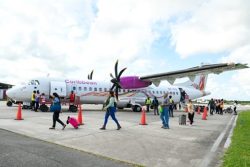Dear Editor,
On 20 October 2022, a “notice to vacate” was sent by the Guyana Lands and Surveys Commission (GLSC) to Theo Xavier, a Wapichan and resident of Potarinau. The notice mentioned “illegal occupation” and advised Theo that he was “required to immediately cease [his] activity”; that “failure to comply will result in legal action”; and that “relevant authorities, including the Guyana Police Force, will be advised of your illegal activities.”
What illegal activities?
Indigenous peoples have the right to lands, territories and resources which they have traditionally owned, occupied and used. This basic principle of international law has been reaffirmed time and again, including in Article 26 of the United Nations Declaration on the Rights of Indigenous Peoples, which Guyana voted to adopt in the UN General Assembly in 2007. International bodies like the UN Committee on the Elimination of Racial Discrimination and Inter-American Commission on Human Rights have also, on numerous occasions, reminded the government of its duty to protect this right.
As Wapichan people, we were occupying and using our traditional lands long before the colonisers came. All that our brother Theo was doing was making a peaceful living, like many others who continue to exercise their right to occupy and use traditional lands. These very lands were identified by our ancestors to the Amerindian Lands Commission more than 50 years ago, as recorded in the Amerindian Lands Commission Report of 1969. As a matter of fact, Theo is living on community land, with the full knowledge and assent of the Potarinau Village Council and the community.
How, then, can our brother Theo be guilty of illegal occupation, when the community itself recognises his right to occupy the land? This right is protected by international human rights law and enshrined in Guyana’s Constitution through the international treaties that have been incorporated into our national laws. Surely there is nothing illegal about raising a few head of cattle, pigs and chickens, or about fishing, farming and living on our traditional lands, where we pass on traditional knowledge to future generations. These are the same activities that our ancestors have undertaken since time immemorial. Since when can such living—an honest living—be called “illegal activities”?
Article 149G of Guyana’s Constitution guarantees that “indigenous peoples shall have the right to the protection, preservation and promulgation of their languages, cultural heritage and way of life.” Our brother has been told to vacate merely for trying to exercise the rights guaranteed to him by his own country’s constitution.
There are other Theos living in a similar manner in other parts of Region 9 and other parts of Guyana— who live on and use our traditional lands. When the Guyana Police Force is used to intimidate a man making an honest living on his ancestral lands, all indigenous people in Guyana should worry. Take note, brothers and sisters: how long before such notices arrive at our own doorsteps? Take note of what is happening to indigenous communities in Isseneru, Chinese Landing, Marudi, and Arau. These and other cases are evidence of the risks involved when indigenous peoples’ land rights are diluted and disrespected in furtherance of activities like tourism, conservation, and mining. How long before their experiences become our own? Indigenous people like Theo and the residents of these villages are becoming strangers on their own lands, and this trend will not fade away on its own.
This is the same government that claims, “we care,” that promises that “indigenous peoples’ land issues will be resolved,” that assures us that “indigenous people are no longer second-class citizens.” The reality is that neither major party, the PPP nor the PNC, has the political will to resolve our longstanding land issues. One was in power for 28 years and the other 23 years. What did they do?
And yet they will come again, making those very claims, promises and assurances, and asking for our votes. How many more Theos will the Government try to forcibly evict from our lands before we stop believing them? More importantly, when will our government finally respect and protect our rights as indigenous peoples?
Regards,
Chief Kokoi (Tony James)
Aishalton Village,
South Rupununi





